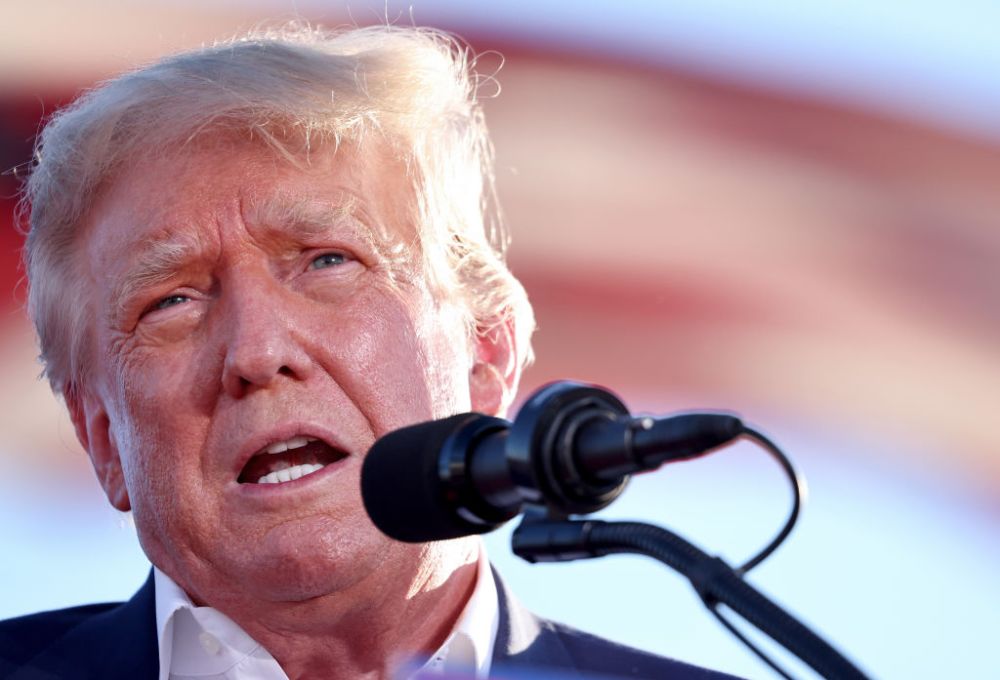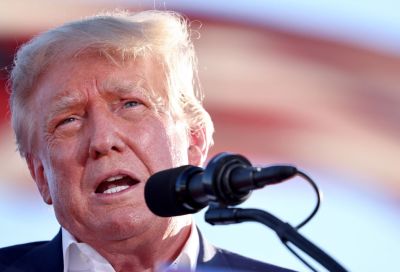Last week the leader of the Republican Party did what leaders are sometimes called to do. He reprimanded a member for not acting in the party’s best interests.
Trump being Trump, he did so publicly rather than privately. And because his target, Mitt Romney, is one of the few remaining Republicans who’s unbeholden to him, his reprimand was destined to fail pitifully. Still, the effort was there.
We should pause here for a moment to reflect on the fact that the table of contents for the archives at the future Donald J. Trump Presidential Library and Casino will contain multiple entries for the word “McMuffin.”
Anyway.
All Trump criticism of Romney derives from Romney having twice voted to impeach him, but many respectable conservatives are also miffed that Mitt hasn’t endorsed Mike Lee. Lee himself pleaded with Romney on Fox News’ airwaves last week to get behind him in the interest of securing a Republican Senate majority next year as he tries to hold off Democratic-endorsed independent Evan McMullin.
Where’s the loyalty, Mitt? What happened to party unity?
Fast forward a few days. Amid some casual musing about American Jews being ingrates who need to “get their act together” and appreciate him more “before it is too late,” Trump volunteered this thought about Colorado’s Senate race on his Truth Social platform.
“MAGA doesn’t Vote for stupid people with big mouths.”
Anyway.
He’s half-joked before about preferring Democrats in office over Republicans who have crossed him but this is the first time I can recall him earnestly discouraging populist voters from supporting their nominee during the general election campaign.
According to the leader of the Republican Party, in other words, there are good reasons not to blindly support one’s party sometimes. Even when control of the Senate hangs in the balance.
Who knew that Donald Trump and Never Trumpers agree on so much?
Crossing the aisle is suddenly in vogue in American politics.
And not just crossing from right to left. After declaring her divorce from the Democratic Party last week, Tulsi Gabbard is now stumping for MAGA fire breathers like Don Bolduc in New Hampshire and Kari Lake in Arizona. During an event for Bolduc on Sunday, she criticized Joe Biden for trying to justify tyrannical policies with good intentions and chose as a historical comparison, er, Adolf Hitler. Gabbard posted a long statement explaining her reasons for ditching the left—“stoking anti-white racism” came up—but I suspect her shift is mostly a reaction to the fact that isolationist anti-anti-authoritarianism now has more traction among right-wing power-brokers than left-wing ones.
In that sense, she’s an old-fashioned crossover voter. She’s letting her policy preferences dictate which party she aligns with. What’s novel and fascinating about so many other recent crossovers, most of whom are moving from right to left, is that it’s happening despite their preferences on policy.
Like, say, with Donald Trump anti-endorsing Joe O’Dea.
One should always be careful not to assume too much about Trump’s policy beliefs. This is a guy, after all, who came out for gun control as president on live television during a meeting with congressional leaders following a mass shooting, forcing his aides to pull him aside afterward and remind him what his position is supposed to be. His grasp of the issues is “not the best,” to borrow a phrase from Trump himself.
But it’s surely strong enough that he recognizes O’Dea would be more likely to vote yes in the Senate on Trump Tax Cuts II in 2025 than his opponent, incumbent Michael Bennet, would. Democratic opposition to Trump during a second term will be implacable. In that sense, Trump’s attack on O’Dea seems irrational.
It isn’t, though. It’s quite rational. It’s all a matter of what you think a political party is for.
Broadly, parties are vehicles to advance a particular vision of America. That vision is mainly achieved through implementing government policy. But not always. Trump may prefer right-wing policies, but what he prizes above all else is his own aggrandizement. His vision of a better America is one where he enjoys fealty, ideally from the country but at a minimum from the American right.
Seeing to it that O’Dea loses his Senate race because he refused to pledge fealty helps Trump achieve that vision. It serves notice to other Republican officeholders that they have no future in politics unless they work toward his aggrandizement. It may produce a smaller Republican caucus in Congress in the near term, sure, but he’s willing to pay that price to acquire a party that’s more loyal to him personally. Especially since, in the longer run, world events may conspire to sweep that hyper-loyal party to power anyway.
Would Trump rather see a Republican takeover of Congress this year with a caucus that’s 80 percent loyal to him or a Republican takeover in 2024 with a caucus that’s 100 percent loyal to him? What do you think?
Amusingly, there’s a school of thought that his attack on O’Dea is a bit of kabuki theater, cleverly coordinated between the two to make the anti-Trump Democratic majority in Colorado more open to supporting O’Dea. I’m skeptical. A disciplined leader who cared more about his party than his ego might be willing to play that game. A narcissist with a loyalty obsession won’t. Trump’s antipathy to O’Dea is heartfelt, I suspect, and further evidence of the 40/50/10 “hostage crisis” dynamic that’s governed the party since 2016. The reason he dominates the GOP is because 40 percent of its voters worship him and might plausibly bolt on his command while the next 50 percent, the zombie partisans who’ll support any Republican over any Democrat, live in mortal terror of that happening.
Attacking O’Dea is Trump’s way of reminding the “hostage” 50 percent that he’ll shoot the party if it stops serving him. There’s not an ounce of doubt in my mind that he’d prefer to be the unchallenged ruler of a GOP relegated to permanent minority status than an elder statesman in a MAGA-fied governing party led by Ron DeSantis.
So he’ll issue the occasional “anti-endorsement” of a Republican when doing so is apt to lead to a better—that is, more Trump-loyal—America. Parties are means, not ends. When they’re not serving your ends, you have no duty to support them. Even if you happen to, uh, lead one of those parties.
One of the ironies of the Trump era is that the other pole of the GOP, the 10 percent of Trump skeptics, feels the same way. The zombie 50 percent shuffle on aimlessly, pulling the lever for every Republican in sight, but the Never Trump contingent and its archenemies in red MAGA caps are each willing to see the left win for a while in the name of influencing how the Republican Party behaves afterward. We have that much in common.
Prominent Never Trumpers have grown more enthusiastic about the idea lately.
Last month Liz Cheney vowed to campaign for Democrats against Republicans this fall while Adam Kinzinger’s super PAC endorsed multiple Democrats (and a few Republicans) in key state races, most notably those for secretary of state. Rusty Bowers, the Republican speaker of the Arizona House, vowed not to support certain candidates from his party on the ballot. Two of Lauren Boebert’s Republican primary opponents turned around and endorsed her Democratic challenger in the general election for her Colorado House seat. Lesser-known officials in other states are also crossing the aisle, a phenomenon the Washington Post describes as Never Trump morphing into Never Trumpism.
Several Democrats in competitive races have loudly rolled out endorsements from prominent state and local Republicans. Probably the most prolific has been Josh Shapiro, the Democrat running against [Doug] Mastriano for governor of Pennsylvania. Shapiro has collected announcements of support from former congressmen Charlie Dent and James C. Greenwood, former Homeland Security secretary Michael Chertoff, several former state lawmakers and former Trump White House lawyer Jim Schultz.
In Arizona, Democratic secretary of state candidate Adrian Fontes is advertising endorsements from Republicans including sitting state representative Joel John and the current mayor of Mesa, John Giles. Sen. Mark Kelly (D-Ariz.) is promoting more than 90 “Republicans for Kelly” including former Arizona Diamondbacks president Richard H. Dozer and Paul Hickman, a former aide to the late Sen. John McCain.
More than 150 Michigan Republicans have signed up for “Republicans for Whitmer” to support the state’s Democratic governor who is running for reelection. In Idaho, almost 50 past and present Republicans, including a former governor, endorsed the Democratic candidate for attorney general, Tom Arkoosh, against former Republican congressman Raúl R. Labrador, who beat the incumbent in May’s primary. Several Washington State Republicans are endorsing Democrat Marie Gluesenkamp Perez for Congress against Joe Kent, who defeated incumbent Republican Jaime Herrera Beutler in the primary.
Most of these people, if not all, surely prefer conservative policies to liberal ones on balance. Their insistence on voting Democratic anyway must be befuddling to the zombie 50 percent of the GOP. Politics is about policy, no? Why would one ever—ever—vote for the party that’ll implement worse policies?
The answer, of course, is the same as it was in the case of Trump and Joe O’Dea. What’s best for America is usually a matter of choosing the party with the best policies, but not always. Cheney, Kinzinger, and the rest have concluded that validating the authoritarian drift in conservatism by electing its adherents for reasons of zombie partisanship would hurt the country even if it ended up producing a marginal income tax rate that’s more to their liking.
The GOP under Trump no longer prioritizes protecting classical liberalism or democracy, so Never Trump conservatives no longer feel a duty to support it. Parties are means, not ends. Reflecting on the many facets of Trump’s corruption exposed by the January 6 committee, a despairing Tom Nichols wondered recently what to make of a constituency that continues to enable him even after it’s seen the evidence. “To vote for anyone still loyal to a party led by the narcissistic sociopath who put our elected officials and our political system itself in peril is to abandon any pretense of caring whether the United States remains a constitutional democracy,” he wrote, starkly.
I wouldn’t say “anyone.” O’Dea and Brian Kemp are still technically “loyal” to the party insofar as they identify as members. But the Republicans in office who have distinguished themselves by opposing Trump’s illiberalism are a small and vanishing breed. The rising stars are those who have either embraced that illiberalism or put their own spin on it. I don’t think the MAGA 40 percent particularly cares whether the United States remains a constitutional democracy, frankly. Some may even dislike the idea insofar as it hinders the American right from imposing its will.
And as to the 50 percent, the people who’ll vote to put Kari Lake in a position to overturn an election in 2024 because they prefer her policies on school choice or whatever, there’ll always be an excuse to keep pulling the lever. Better the autocrat than the Democrat.
Never Trumpers have concluded that the only way this twisted party will retrench is if it suffers defeat after defeat at the polls. For them, for the time being, crossing the aisle is the way to a better America.
Which brings us back to Mitt Romney and Mike Lee.
In my experience there are few modern Republican officials whom conservative intellectuals are more protective of than Lee. They’ll indulge criticisms of other brainy Senate Republicans like Ted Cruz and Josh Hawley since the populist grandstanding to which those two reliably stoop irritates even their defenders at times. But Mike Lee?
Soft-spoken, unassuming Mike Lee? Mike Lee is a serious legislator, a man who’s championed substantive bills on subjects ranging from the child tax credit to the War Powers Act. As a former Supreme Court clerk, his intellectual credentials are impeccable. He had the basic moral sense to oppose Donald Trump’s nomination in 2016 and ended up voting for a third-party candidate for president that fall. A guy named … Evan McMullin.
To educated movement conservatives, Mike Lee is living proof that the modern Republican Party can still produce impressive, thoughtful members of Congress, never mind all the clowns who keep emptying out of the MAGA clown car.
In reality, though, no one in the Senate better represents the corruption of intellectual conservatism by Trumpism than Mike Lee.
That’s a bold claim, I know, in a chamber that includes figures like Cruz and Lindsey Graham. But Cruz and Graham have never really pretended to be anything they aren’t. Cruz is a cynical huckster who positioned himself as a populist to gain power and stuck with it all the way to spearheading the procedural shenanigans on January 6. Graham is a careerist maneuverer who pivoted effortlessly from McCain courtier to Trump courtier in the name of political relevance. Congress has always had guys like that. Mike Lee, the constitutionalist’s constitutionalist, was different.
But he wasn’t. As we now know, Lee spent the post-election period quietly searching for ways to overturn the election on Trump’s behalf with a focus on how swing states won by Biden might submit competing pro-Trump electoral slates. He went as far as to urge Mark Meadows to consult with conspiracy theorist Sidney Powell about the election, describing her as a “straight shooter” who had a strategy to “put several states back in play.”
The difference between his actions and Cruz’s leading up to the insurrection were differences in degree, reflecting their different personal styles. Cruz, the panderer who loves to hear his own voice and will never relinquish his presidential dreams, wanted to stand in the well of the Senate and lead the objections to Biden’s electoral votes on January 6. Lee, the low-key “intellectual,” preferred to work behind the scenes to try to keep Trump in power, searching in vain for some legal loophole that might let the president execute an autogolpe “legitimately.”
And when he couldn’t find one, he delivered a Senate floor speech disingenuously expressing his great relief that no state sent any alternate slates of electors to Congress—the very thing he was privately hoping might happen. Mike Lee, “constitutionalist,” was careful to protect his public reputation as a principled defender of the rule of law.
His work on the election was the end of a dark journey toward Trumpism that at one point had Lee comparing Trump to Mormon religious figures at political rallies. He apologized for that later, but chew on this quote: “To my Mormon friends, my Latter-day Saint friends, think of him as Captain Moroni. … He seeks not power, but to pull it down. He seeks not the praise of the world or the fake news, but he seeks the well-being and the peace of the American people.”
Forget the religious reference. Imagine saying of Donald Trump, in any context, that he doesn’t seek power or the praise of the world, and saying so with a straight face.
To his eternal shame, Lee couldn’t even bring himself to vote to convict Trump at his impeachment trial for inciting an insurrection.
He’s an embarrassment, and his post-election conduct is a disgrace to the American right. If he were half the man conservative media has cracked him up to be, he would have lobbied Meadows behind the scenes relentlessly to end the “stop the steal” nonsense before it caused a constitutional crisis. Whether he earnestly believed that Trump might stay in power or just wanted Trump to think that he did in hopes of currying favor, ousting him from the Senate to show his colleagues what happens to people who abet a coup attempt would be an act of civic hygiene.
All of which Mitt Romney understands perfectly well. Having voted to impeach Trump twice, Romney actually is the sort of principled legislator whom Lee’s fanboys like to pretend Lee is. His highest priority at this point, I suspect, is protecting American democracy; despite being a member of the same party, Mike Lee failed to do so and therefore Romney can’t endorse him. Parties are means, not ends.
If the voters of Utah agree, and we end up with Sen. McMullin and a Democratic majority next year, remember to blame Mike Lee for that. No one else.







Please note that we at The Dispatch hold ourselves, our work, and our commenters to a higher standard than other places on the internet. We welcome comments that foster genuine debate or discussion—including comments critical of us or our work—but responses that include ad hominem attacks on fellow Dispatch members or are intended to stoke fear and anger may be moderated.
With your membership, you only have the ability to comment on The Morning Dispatch articles. Consider upgrading to join the conversation everywhere.